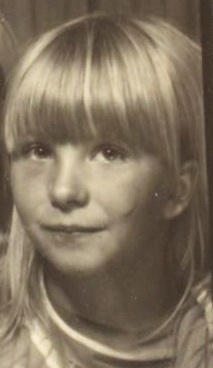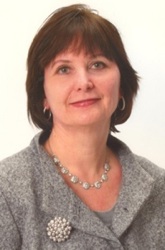
Valerie Peterson
My only sister, Valerie Peterson, was killed 39 years ago today on a Thursday afternoon. She was just 8 years old.
We had been late that morning — in a rush out of the car for school with no foreshadowing of the terrible events that would happen that afternoon. No goodbyes or looks backward. The events that followed that afternoon are as clear in my mind as they are this afternoon — what happened, who was there and what was said. I got up the next morning hoping it had been a terrible dream but instead realized a nightmare.
At the funeral home I remember a clock ticking loudly during long silences of the arrangements, how my sister’s face had been disfigured by hitting the truck after she flew up in the air, and the coldness of her body. My brother took me to get a black dress in town. I never found one. I only remember the silence of the clerks and the news announcements on the radio about my sister and reward information.
I remember going back to school for the final week but no one said anything — as if I had been out with a cold. I picked up my sister’s books and belongings from her classroom and was handed them in silence. That silence continued by members of the community who had information about the crime and refused to give it to law enforcement.
During the years that have followed, I cannot explain the amount of pain in me or for my family because of her death. The hours spent with law enforcement and DCI about evidence and the hope for a conviction has been agonizing. The pain and anger has never lessened despite the passing of years. I have a difficult time talking about her death even now without feeling utter despair and overwhelming grief — a deep wound that has never healed and never will. The despair is not only about her death but also that there has been no conviction despite strong evidence.
I recently asked again for her case to be re-examined. Hope never fades that the person will have to publicly face what he did. Homicide is defined as the act of killing a human being. Having my sister’s case defined as anything less than homicide is a travesty of justice. My sister is dead because of someone’s actions. I was once told by a law officer that the only thing that could be done against the person who killed my sister was issuance of a traffic ticket. That is wrong. My sister was not powerful or influential but a human being who deserves justice and whose life was worth more than a traffic ticket.
I went to law school because I wanted to work in human rights. Working in Bosnia tore my soul down but built it back up — giving me an inner strength from what had transpired there. The massive genocide and senseless killing, rapes and destruction was overwhelming, but seeing a country try to build itself up despite faltering steps helped build a resolve in me that it is right to hold people accountable for crimes no matter how difficult, uncomfortable or how long it takes. My work in Nepal on legal and human rights reform filled me with resolve that with even small actions and changes in legal assistance, the courts and police can make huge strides for those who need justice the most. I will soon be in Iraq or Afghanistan for work that will focus on human rights and assuring access to law for victims, women and children.
The determination I have to see justice for victims or those unaware of their rights, as well as having justice upheld despite overwhelming obstacles has been a result of feeling wronged, powerless and insignificant by the criminal justice system, the law and community. Those are harsh sentiments but honest. Victims of cold cases, their families and all victims need their cases treated with diligence and equality by the legal and criminal justice system and not herded into silence and shame.
I will no longer go away and be quiet and accept the “fact” that all that can be done has been done or that I should be held powerless and silent by the criminal justice system and others. I am working with the American Bar Association on the standards for evidence maintenance and preservation in cold cases. I am working to organize a conference on evidence issues for law enforcement. Hopefully Iowa evidence code can be examined and changed to assure evidence in cold cases is maintained at the highest standards for future trials. My brother and I have initiated a scholarship in Iowa to support students who are studying criminal justice and plan to remain in Iowa. I teach human rights in a law school and have written about human rights abuses. I support a young woman in Nepal attending law school and another in Bosnia just beginning her studies in law and economics. Neither of these young women would be able to do this without financial and emotional support. Rule of law and judicial systems are fragile in these countries and needs to be supported.
After seeing what obstacles others have to overcome in fragile judicial systems, I will no longer be silent, made to feel insignificant or shamed to ask for justice by the criminal justice system, legal system or a community and made to feel powerless and voiceless in my own country.
Shortly before my sister was killed, my parents re-decorated our bedroom. My sister was a kind soul, and she felt very sad one night and almost in tears that she had been left out of some of the decisions. I felt terrible and said that we should change where we put our clothes in the drawers so it would be fair to each of us so she would not be sad and things would be equal.
As I finish this, 39 years ago my sister was still alive but inching closer to that moment when she was killed. The person who is suspected of killing her is alive and living in the same community. Much of the work that I do is to try to correct some of the injustices in the world because of what happened in her case. Her case has not represented what is right, equal or just. Justice waits for her and other cold cases and victims.
I believe our legal system is one of the best in the world. Victims deserve a real resolution to their cases no matter their age, wealth, past or how uncomfortable it makes the community. Families of victims should not feel shamed into silence, ashamed to ask for justice or treated as if a crime or person is insignificant. That’s what I’ve seen in other countries trying to fix their system. I know it is within our system to rise to the challenge and not falter.
— — —

Eileen Meier
Eileen Meier received her JD from the Washington College of Law, American University and her MPH from Johns Hopkins Bloomberg School of Public Health.
She represented domestic violence victims through a legal aid project with the Women’s Law Center of Maryland, taught legislative advocacy at Georgetown University for seven years and international human rights law at the University of Baltimore, School of Law for five years. She has lectured on gender rights at the University of Sarajevo in Bosnia and the Kathmandu School of Law in Nepal.
Eileen worked for Senator Tom Harkin as a policy fellow and as the executive director of a national advocacy group in Washington, D.C. She’s worked with the Bosnian government and NGO’s to reform gender rights’ laws and court reform in Bosnia, and most recently for the European Commission in Nepal on a human rights and legal reform project.
She has published articles on human rights, done legal rights assessments in Ghana, Liberia, Sierra Leone, South Africa and Israel, and serves as an American Bar Association Liaison to the American Bar Association’s Center for Human Rights.
Eileen serves as Iowa Cold Cases’ Director of Advocacy Affairs.
Contact Eileen




I had not heard of this case until today. I extend to you my deepest sympathy, and while I fully understand your anger, pain, and anguish that justice has not been served, I do feel that the guilty party is being punished – constantly, every day, simply for having to carry the knowledge of the deed within his heart. This knowledge doesn’t go away, and it never will. It’s more than just a guilty conscience; it’s the awareness that this has never been resolved, that the wheels of justice could turn at any moment….and that the eyes of those who know him, know also of his deed, and that since this first happened, they have never been able to look at him (or at themselves) the same way again. God bless you, and God bless Valerie.
I hope one day very soon that Valerie’s killer will be brought to justice and punished to the fullest extent of the law. I’m so very sorry for Ms. Meier and the lifelong suffering that she and her family has endured.
Thanks so much for your comment, Margaret. Valerie’s family deserves nothing less, and we, too, are confident the killer will eventually be exposed and brought to justice. One can only hide so long. Thank you again.